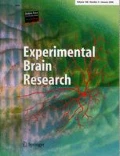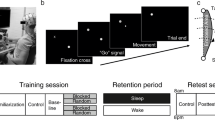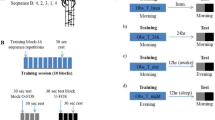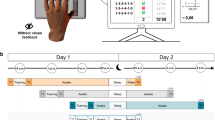Abstract
There is increasing evidence supporting the notion that the contribution of sleep to consolidation of motor skills depends on the nature of the task used in practice. We compared the role of three post-training conditions in the expression of delayed gains on two different motor skill learning tasks: finger tapping sequence learning (FTSL) and visuomotor adaptation (VMA). Subjects in the DaySleep and ImmDaySleep conditions were trained in the morning and at noon, respectively, afforded a 90-min nap early in the afternoon and were re-tested 12 h post-training. In the NightSleep condition, subjects were trained in the evening on either of the two learning paradigms and re-tested 12 h later following sleep, while subjects in the NoSleep condition underwent their training session in the morning and were re-tested 12 h later without any intervening sleep. The results of the FTSL task revealed that post-training sleep (day-time nap or night-time sleep) significantly promoted the expression of delayed gains at 12 h post-training, especially if sleep was afforded immediately after training. In the VMA task, however, there were no significant differences in the gains expressed at 12 h post-training in the three conditions. These findings suggest that “off-line” performance gains reflecting consolidation processes in the FTSL task benefit from sleep, even a short nap, while the simple passage of time is as effective as time in sleep for consolidation of VMA to occur. They also imply that procedural memory consolidation processes differ depending on the nature of task demands.





Similar content being viewed by others
References
Balas M, Netser S, Giladi N, Karni A (2007) Interference to consolidation phase gains in learning a novel movement sequence by handwriting: dependence on laterality and the level of experience with the written sequence. Exp Brain Res 180(2):237–246
Beck AT, Steer RA (1987) The Beck depression inventory. Psychological Corporation
Censor N, Karni A, Sagi D (2006) A link between perceptual learning, adaptation and sleep. Vision Res 46(23):4071–4074
Cohen DA, Pascual-Leone A, Press DZ, Robertson EM (2005) Off-line learning of motor skill memory: a double dissociation of goal and movement. Proc Natl Acad Sci USA 102(50):18237–18241
Donchin O, Sawaki L, Madupu G, Cohen LG, Shadmher R (2002) Mechanisms influencing acquisition and recall of motor memories. J Neurophysiol 88:2114–2123
Doyon J (2008) Motor sequence learning and movement disorders. Curr Opin Neurol 21(4):478–483
Doyon J, Benali H (2005) Reorganization and plasticity in the adult brain during learning of motor skills. Curr Opin Neurobiol 15(2):7–161
Doyon J, Ungerleider LG (2002) Functional anatomy of motor skill learning. In: Squire LR, Schacter DL (eds) Neuropsychology of memory, 3rd edn. Guilford Press, New York, pp 225–238
Doyon J, Song AW, Karni A, Lalonde F, Adams MM, Ungerleider LG (2002) Experience-dependent changes in cerebellar contributions to motor sequence learning. Proc Natl Acad Sci USA 99(2):22–1017
Doyon J, Penhune V, Ungerleider LG (2003) Distinct contribution of the cortico-striatal and cortico-cerebellar systems to motor skill learning. Neuropsychologia 41:252–262
Dudai Y (2004) The neurobiology of consolidations, or, how stable is the engram? Annu Rev Psychol 55:51–86
Fischer S, Hallschmid M, Elsner AL, Born J (2002) Sleep forms memory for finger skills. Proc Natl Acad Sci USA 99(18):11987–11991
Fischer S, Nitschke M, Melchert UH, Erdmann C, Born J (2005) Motor memory consolidation in sleep shapes more effective neuronal representations. J Neurosci 25(49):11248–11255
Gaab N, Paetzold M, Becker M, Walker MP, Schlaug G (2004) The influence of sleep on auditory learning: a behavioral study. Neuroreport 15(4):731–734
Gais S, Plihal W, Wagner U, Born J (2000) Early sleep triggers memory for early visual discrimination skills. Nat Neurosci 3(12):1335–1339
Hauptmann B, Karni A (2002) From primed to learn: the saturation of repetition priming and the induction of long-term memory. Brain Res Cogn Brain Res 13:313–322
Hauptmann B, Reinhart E, Brant SA, Karni A (2005) The predictive value of the levelling off of within-session performance for procedural memory consolidation. Cogn Brain Res 24:181–189
Horne JA, Östberg O (1976) A self-assessment questionnaire to determine morningness–eveningness in human circadian rhythms. Int J Chronobiol 4:97–110
Huber R, Ghilardi MF, Massimini M, Tonini G (2004) Local sleep and learning. Nature 430(6995):78–81
Karni A, Sagi D (1993) The time course of learning a visual skill. Nature 365(6443):250–252
Karni A, Tanne D, Rubenstein BS, Askenasy JJ, Sagi D (1994) Dependence on REM sleep of overnight improvement of a perceptual skill. Science 265(5172):679–682
Karni A, Meyer G, Jezzard P, Adams MM, Turner R, Ungerleider LG (1995) Functional MRI evidence for adult motor cortex plasticity during motor skill learning. Nature 377(6545):8–155
Karni A, Meyer G, Rey-Hipolito C, Jezzard P, Adams MM, Turner R, Ungerleider LG (1998) The acquisition of skilled motor performance: fast and slow experience-driven changes in primary motor cortex. Proc Natl Acad Sci USA 95(3):8–861
Korman M, Raz N, Flash T, Karni A (2003) Multiple shifts in the representation of a motor sequence during the acquisition of skilled performance. Proc Natl Acad Sci USA 100(21):12492–12497
Korman M, Doyon J, Doljansky J, Carrier J, Dagan Y, Karni A (2007) Daytime sleep condenses the time course of motor memory consolidation. Nat Neurosci 10(9):13–1206
Krakauer JW, Shadmehr R (2006) Consolidation of motor memory. Trends Neurosci 29(1):58–64
Krakauer JW, Ghez C, Ghilardi F (2005) Adaptation to visuomotor transformations: consolidation, interference, and forgetting. J Neurosci 25(2):473–478
Maquet P, Schwartz S, Passingham R, Frith C (2003) Sleep-related consolidation of a visuomotor skill: brain mechanisms as assessed by functional magnetic resonance imaging. J. Neurosci 23:1432–1440
Mazzoni P, Krakauer JW (2006) An implicit plan overrides an explicit strategy during visuomotor adaptation. J Neurosci 26(14):3642–3645
McGaugh JL (2000) Memory—a century of consolidation. Science 287(5451):248–251
Morin A et al (2008) Motor sequence learning increases sleep spindles and fast frequencies in post-training sleep. Sleep 31(8):1149–1156
Oldfield RC (1971) The assessment and analysis of handedness: the Edinburgh inventory. Neuropsychologia 9(1):97–113
Peigneux P, Laureys S, Fuchs S, Destrebecqz A, Collette F, Delbeuck X, Phillips C, Aerts J, Del Fiore G, Degueldre C, Luxen A, Cleeremans A, Maquet P (2003) Learned material content and acquisition level modulate cerebral reactivation during posttraining rapid-eye-movements sleep. NeuroImage 20:125–134
Press DZ, Casement MD, Pascual-Leone A, Robertson EM (2005) The time course of off-line motor sequence learning. Brain Res Cogn Brain Res 25(1):375–378
Rauchs G, Desgranges B, Foret J, Eustache F (2005) The relationship between memory systems and sleep stages. J Sleep Res 14:123–140
Rechtschaffen A, Kales A (1968) A manual of standardized terminology, techniques and scoring system for sleep stages of human subjects. Brain Information Service/Brain Research Institute, UCLA, Los Angeles
Robertson EM, Pascual-Leone A, Press DZ (2004) Awareness modifies the skill-learning benefits of sleep. Curr Biol 14:208–212
Roth DA, Kishon-Rabin L, Karni A (2005) A latent consolidation phase in auditory identification learning: time in the no sleep state is sufficient. Learn Mem 12:159–164
Shadmehr R, Brashers-Krug T (1997) Functional stages in the formation of human long-term motor memory. J Neurosci 17(1):409–419
Smith CT, Aubrey JB, Peters KR (2004) Different roles for REM and stage 2 sleep in motor learning: a proposed model. Psychologica Belgica 44(1/2):79–102
Song S, Howard JH Jr, Howard DV (2007) Sleep does not benefit probabilistic motor sequence learning. J Neurosci 27(46):83–12475
Stickgold R, Whidbee D, Schirmer B, Patel V, Hobson A (2000) Visual discrimination task improvement: a multi-step process occurring during sleep. J Cogn Neurosci 12(2):246–254
Walker MP, Brakefield T, Morgan A, Hobson A, Stickgold R (2002) Practice with sleep makes perfect: sleep-dependent motor skill learning. Neuron 35:205–211
Walker MP, Brakefield T, Seidman J, Morgan A, Hobson A, Stickglod R (2003) Sleep and the time course of motor skill learning. Learn Mem 10:275–284
Acknowledgments
Support for this research was provided by the Canadian Institutes of Health Research (JD, JC, AHT and AK, HB, LGU), and by a fellowship from the Natural Sciences and Engineering Research Council of Canada (AM). The authors are grateful to Sonia Frenette, the project coordinator, to Anne Bellio and Odile Jolivet for work in developing the experimental paradigm, and to our technicians and research assistants for day-to-day study management.
Author information
Authors and Affiliations
Corresponding author
Additional information
J. Doyon and M. Korman contributed equally.
Rights and permissions
About this article
Cite this article
Doyon, J., Korman, M., Morin, A. et al. Contribution of night and day sleep vs. simple passage of time to the consolidation of motor sequence and visuomotor adaptation learning. Exp Brain Res 195, 15–26 (2009). https://doi.org/10.1007/s00221-009-1748-y
Received:
Accepted:
Published:
Issue Date:
DOI: https://doi.org/10.1007/s00221-009-1748-y




